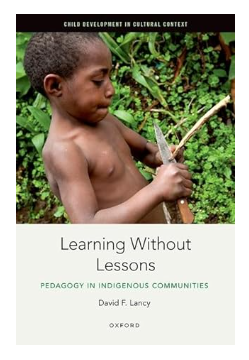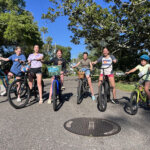






Learning Without Lessons: How Kids Figure Things Out on Their Own
David Lancy is an Emeritus Professor of Anthropology at Utah State University who has written several books, including The Anthropology of Childhood, and Raising Children. He also co-authored this piece with Let Grow Co-Founder Peter Gray in The Journal of Pediatrics, “Decline in Independent Activity as a Cause of Decline in Children’s Mental Well-Being.” Oxford has published his latest work, Learning Without Lessons: Pedagogy in Indigenous Communities, which inspired this essay:
Learning Without Lessons, by David Lancy
A thread running through the Free-Range Kids / Let Grow movement is that much of what we currently consider “proper” child-rearing may actually be harmful (Gray et al 2023). Ethnographic accounts of child-rearing among indigenous peoples support this claim. Let’s focus on what anthropologists have learned about how kids learn, from 150 years of fieldwork around the globe.
Kids were learning long before school existed.
My work as a cultural anthropologist revealed that before the advent of schooling, pedagogy — teaching — was very different from what we see in modern schools and homes. In a remote village in the Amazon, for instance, children learn “geography” by actively exploring the environment with others who are more expert and willing to share their knowledge. We see no examples of deliberately organized “lessons.”
In direct contrast to our adult-managed and overprotective school systems, indigenous pedagogy valorizes:
*Self-initiated and self-guided learning
*Learning informally from others through collaborative activity
*Learning by doing—not by waiting for verbal instruction.
Minds are most open when learning by doing.
Indigenous pedagogy is deeply informed by the bedrock belief that children must be autonomous, and their learning self-initiated. This can be hard for westerners to watch. For instance, indigenous parents tolerate young children playing with sharp knives because, “That’s how they learn.” And, “If they get cut, they’ll be more careful.”
Meanwhile, in the WEIRD (Western, Educated, Industrialized, Rich and Democratic) countries, when children go to school, they must learn to “sit still.” They lose almost all their agency to an adult authority.
Play becomes less educational the more it is adult-directed.
And even while we now acknowledge the educational potential of play, the study of indigenous children at play suggests that the value of play is much diminished when it is shaped and supervised by adults. Where no single person is in charge, children gain the freedom to create their own rules and standards, changing them to fit the needs of the play group. Inventiveness and creative solutions flourish. To the extent that schoolchildren experience play at all, it is usually organized to produce conformity and adherence to rules (Lancy and Grove 2011).
Likewise, in contemporary society, knowledge is carefully packaged and delivered according to schedule. The “packages” — lessons — are opened and presented by the teacher. There is little scope for rearranging, combining, or accelerating. While individual educational plans (IEP) are touted, in fact children exercise little control of what, how, or when they learn the rigid curriculum. In the village, meanwhile, children create and manage their own IEPs, as it were, and rarely require adult intervention. And, as an obvious corollary, learning without lessons — self-managed education — leads to enhanced self-confidence, curiosity, and resilience.
When kids eavesdrop, be glad.
The child learns the local environment through observing participants as they gather, garden, fish, and so on. And they also learn by paying attention to informative discussions among those processing the food — determining the distribution of newly butchered game, for instance, and cooking it. Individual exploration, play, and repeated practice are additional avenues for learning.
In effect, there are multiple, overlapping opportunities to acquire the knowledge and skills to be successful in the indigenous community. Children display considerable sophistication in finding resources for learning — including finding expert and sympathetic role models. Often, the first step towards seeking the benefit of expert guidance or the loan of tools to practice a new skill is to offer to help the expert.
Helping out 2-year-olds vs. 2-year-olds helping out.
Research has shown that children even under age two are primed to pay attention to what adults are doing and try to contribute to their efforts, often with positive results. Unfortunately, WEIRD children’s volunteer efforts are often spurned as increasing the worker’s burden. Consequently, their “helping” is less encouraged and tends to disappear from the child’s repertoire. It is then replaced by formal lessons or chores that are contracted for. What were self-initiated, self-guided acts become part of the parent or teacher’s agenda.
Absent from indigenous education is coercion. There is widespread agreement that children should be allowed to design their own education. This autonomy is somewhat reduced when children reach middle childhood (ages 5-9), and must apply their learning to chores as part of the “household economy” (gardening, herding, gathering firewood). But even as young workers, children are expected to reliably carry out assigned chores with little or no supervision. They must take responsibility for their own success or failure and make appropriate adjustments. This leads naturally to the development of resilience and persistence — attributes conspicuously lacking in our children (Gray et al 2023). And, not surprisingly, the angst associated with contemporary western childhood is virtually absent from indigenous communities.
Why kids need more “learning without lessons”:
- The decline in free play means children no longer have a time to enjoy peer interaction without adult oversight. Recess has been crowded out by increased “seat time.” At home, parents feel obligated to manage children’s play life to ensure that it is truly educational. For older children, pick-up games in the park have been replaced by music lessons, homework, and organized sports. In this way, most of the characteristics of school pedagogy have permeated even the child’s after-school life.
- In the village, youth have great autonomy. Learning is self-initiated. It is woven into the flow of daily life, rather than encapsulated in formal lessons. Unlike school, where groups of students are herded along, the learner proceeds at her own pace, yielding smooth learning curves.
- Of all the principles of Indigenous pedagogy, perhaps the most widely acknowledged is that children learn best from direct, hands-on experience. Many societies even assert that one can only learn from direct experience. Contrast this with the standardized curricula and authority figures of contemporary schools.
- Direct experience often comes about as a result of the child’s need to be helpful and “fit in.” The child helper is eased into ongoing work activity, allowing them opportunities to learn without explicit instruction. In WEIRD society, children as young as fourteen months bid for a helper’s role but are often rebuffed and redirected.
A considerably longer catalog of contrasts can be found in Learning Without Lessons.
If this is how children have grown competent forever…
In conclusion: Anthropology contributes to the Let Grow movement by providing models of childhood rooted in antiquity. If human children grew to adulthood largely through their own initiative, it seems likely there are many collateral benefits to this practice that are not available to over-protected, over-managed contemporary children. Expanding children’s freedom to learn nurtures the growth of numerous traits (curiosity, initiative, persistence, resilience, altruism—to name a few) that reduce the peril of a “failure to launch.”
Sources referred to:
Gray, P., Lancy, D. F. and Bjorkland, D. F. (2023) Decline in independent activity as a cause of decline in children’s mental wellbeing: Summary of the evidence. Journal of Pediatrics 260 article # 113352
Lancy, D. F. and Grove, M. A., (2011) Marbles and Machiavelli: The role of game play in children’s social development. American Journal of Play. 3: 489-499.
Lancy, D.F. (2024) Learning Without Lessons: Pedagogy in Indigenous Communities. Oxford: Oxford University Press.

Prof. David Lancy




Good advice. Constant surveillance, restrictions, direction, and oppressive safetyism hinder kids’ learning opportunities.